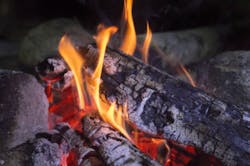Last year, 450,000 people sought medical treatment for burn injuries, and 40,000 were hospitalized. Not surprisingly, summer – with its cookouts and campfires – is the busiest season for burn injuries.
“The old adage of ‘When you play with fire, you get burned’ is true,” says Richard Gamelli, M.D., director of the burn unit at Loyola University Medical Center. “You must always be very serious and attentive when fire is involved. Injuries due to fire happen easily and fast, especially when children are involved or alcohol has been abused.”
Gamelli, who also serves as president of the International Society for Burn Injuries, points out that young children are especially vulnerable. Oftentimes, kids burn themselves by touching the sides of cooking grills.
Parents should keep children away from cooking areas at all times, Gamelli says, and they should watch kids closely even after the cooking is done, because grills remain hot.
Likewise, adults should exercise caution when approaching the previous night’s campfire.
“At Loyola, we have had patients who got burned after contact with a log from the previous night’s fire, thinking the fire was out,” Gamelli says. “Fire can burn for hours after ignition and the temperature can remain dangerously hot.”
Gamelli offers these safety tips for fire pits, barbecues and campfires:
- Keep an eye on anything that burns.
- Keep children and pets away from the cooking area and supervise them around recreational fires.
- Place the barbecue, fire pit or campfire in an open area away from all walls, fences or other structures, especially wooden construction that can ignite.
- Never burn anything in, on or under a garage, breezeway, carport, porch, deck or any other structure that can catch fire.
- Keep a fire extinguisher close at hand and be familiar with how to operate it.
- If you burn yourself, or someone else is burned, seek immediate medical attention.
- Do not abuse alcohol while around fire.
- Place a metal cover over a burning fire pit to contain embers.
- Never leave a fire burning unattended.
- Coals and logs can burn and stay hot for a long time – do not kick them or touch them and cover them to protect others from accidental contact.
“Whether a campfire, a fire pit or a barbecue grill, you should always take extreme care when using devices that have the potential to cause great harm to yourself and others if used in a careless, irresponsible manner,” Gamelli says.
According to the Centers for Disease Control and Prevention, burns and fires are the third-leading cause of death in the home. In 2010, a fire-related death occurred every 169 minutes. A fire injury occurred every 30 minutes.
